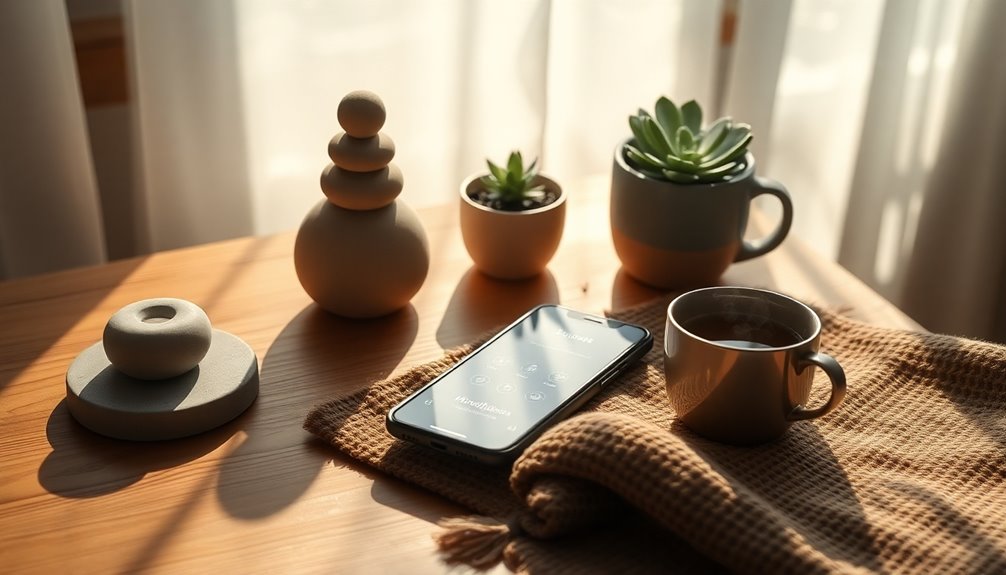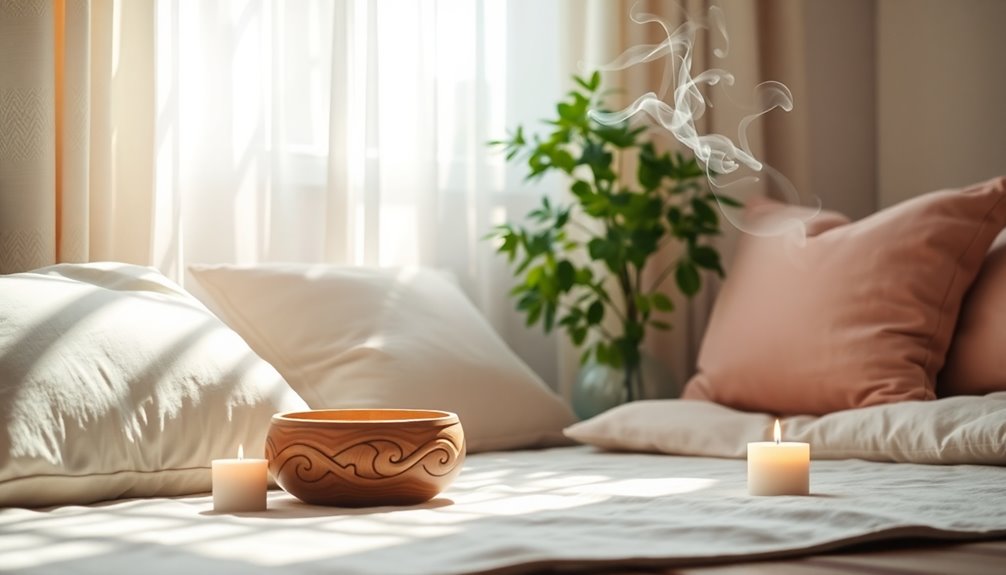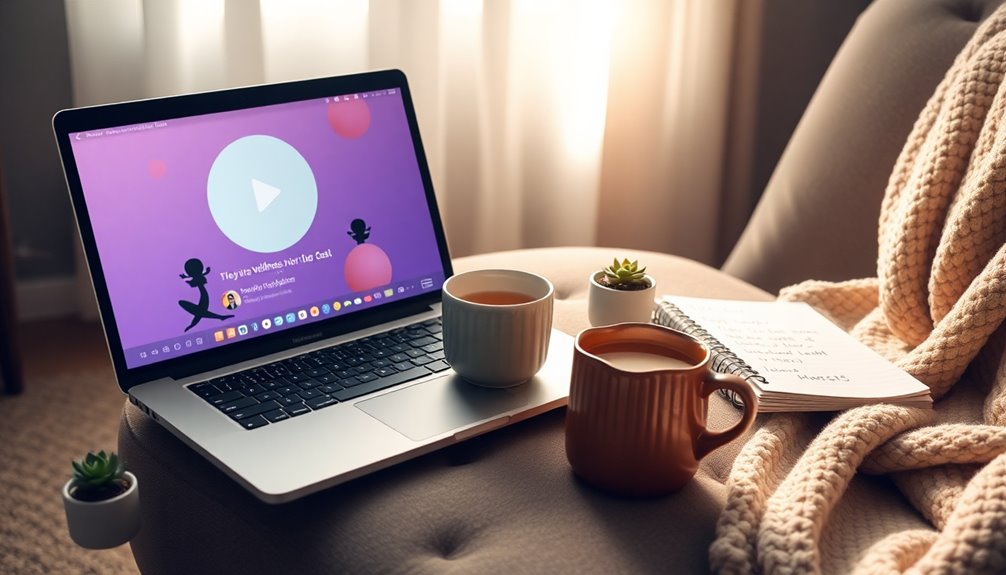Mental health is a pressing issue for many of us, and I’ve found that the right tools can make a real difference. From mindfulness apps to journaling techniques, there are so many options out there aimed at improving our mental well-being. It’s fascinating to see how accessible these resources can be. I invite you to explore some of the top tools that have shown promising results in managing stress and emotions. You might discover something unexpected.
Key Takeaways
- Mindfulness apps like Headspace and Calm provide guided meditations to reduce stress and improve focus throughout the day.
- Journaling promotes self-discovery, reflection, and emotional processing, helping to track progress and gain clarity on personal goals.
- Online therapy platforms offer accessible counseling services with licensed therapists, allowing for flexible scheduling and anonymity.
- Mood tracking apps enable users to log emotions and identify patterns, facilitating a better understanding of their emotional journeys.
- Wellness podcasts provide insights on mental health, incorporating expert advice and guided meditations for enhanced mindfulness and self-care.
Mindfulness Apps

When I dive into mindfulness apps, I often find a treasure trove of tools designed to enhance mental well-being. These apps offer a range of guided meditations, breathing exercises, and even reminders to help us pause and reset throughout the day.
I appreciate how they cater to different needs—whether I’m looking to tackle anxiety or simply want to improve focus. The user-friendly interfaces make it easy to explore new techniques, and I love how I can track my progress over time.
What’s even better is their ability to integrate seamlessly into my daily routine; I can practice mindfulness anytime, anywhere.
It’s been an incredible journey, and I genuinely encourage you to explore the benefits these apps can bring to your life.
Journaling Techniques

I’ve found that journaling can be a powerful tool for mental health.
Daily reflection practices help me stay grounded, while prompt-based journaling sparks creativity and insight.
Plus, I love how expressive writing allows me to process emotions and thoughts more freely.
Daily Reflection Practices
Although many overlook the power of daily reflection, I’m convinced that journaling can significantly enhance mental well-being. Each evening, I take just a few minutes to jot down my thoughts, feelings, and experiences from the day. This simple practice helps me process emotions and gain clarity. I find it’s a moment for self-discovery, and I often uncover patterns that I wasn’t aware of before.
I focus on what I’m grateful for and any challenges I faced, which helps me shift my perspective. Sometimes, I write about my goals and aspirations, letting my mind wander freely. By making daily reflection a habit, I cultivate a deeper understanding of myself, promoting resilience and reducing stress. It’s truly transformative!
Prompt-Based Journaling
While daily reflection is powerful, prompt-based journaling takes this practice a step further by providing specific questions or statements that guide my thoughts.
These prompts help me burst through mental blocks, pushing me to explore deeper feelings and unresolved issues. I often find prompts like “What made me smile today?or “What challenges did I face?spark insightful revelations. They make it easier to dive into my emotions without feeling overwhelmed. Plus, I appreciate how they shift my focus from random thoughts to targeted reflection.
Over time, I’ve noticed that these structured entries not only enhance self-awareness but also help me track my progress. Prompt-based journaling is truly a valuable tool in my mental health toolkit.
Expressive Writing Benefits
Building on the insights gained from prompt-based journaling, expressive writing offers its own unique set of benefits. I’ve found that this technique allows me to delve deeper into my thoughts and feelings without any constraints. It’s like unlocking a door to my innermost thoughts.
By freewriting, I release emotions I didn’t even know I was holding onto, which often leads to breakthroughs in understanding myself. Expressive writing also helps me process challenging experiences. When I pour my heart onto the page, I gain clarity and perspective.
I notice my anxiety decreases, and my mood lifts. It’s an incredibly cathartic practice. If you haven’t tried it yet, I encourage you to grab a pen and let your words flow—you might be surprised at what you discover.
Guided Meditation Resources

Guided meditation resources can be a powerful addition to anyone’s mental wellness toolkit. I’ve found these resources incredibly helpful in cultivating mindfulness and reducing stress.
Apps like Headspace and Calm offer structured sessions that fit easily into my daily routine, whether I’ve five minutes or an hour. YouTube is another fantastic option; I often stream guided meditations that focus on different themes like anxiety relief or sleep improvement.
I’ve discovered that listening to soothing voices and calming background sounds can make all the difference in my ability to relax and center myself. No matter where you’re on your mental health journey, exploring guided meditation can help you find a moment of peace in your busy life.
Therapy Platforms

When it comes to seeking help, I’ve found therapy platforms can be a game changer.
They offer online counseling services that make support more accessible and often come with affordable therapy options.
It’s incredible how technology connects us to the mental health resources we need.
Online Counseling Services
Online counseling services have revolutionized the way we approach mental health care, making therapy more accessible than ever before. With just a few clicks, I can connect with licensed therapists from the comfort of my home. It’s incredibly convenient; I can schedule sessions that fit my lifestyle, eliminating the stress of travel.
These platforms often use secure video calls, chat, or messaging, allowing me to communicate in a way that feels comfortable. I appreciate the variety of specialists available, catering to different issues and preferences. Plus, I can choose to remain anonymous if that makes me feel safer.
Affordable Therapy Options
Finding affordable therapy options has become a priority for many individuals seeking mental health support. I’ve explored various therapy platforms that offer sliding scale fees or subscription models, making therapy more accessible without breaking the bank.
Services like BetterHelp and Talkspace provide licensed therapists at rates often lower than traditional in-person sessions. I appreciate how these platforms allow me to connect with professionals from the comfort of my home, reducing travel time and expenses.
Another option I discovered is community mental health centers, which typically offer low-cost sessions based on income. Utilizing these resources not only eases financial burdens but also promotes consistent mental health care. Investing in my mental well-being shouldn’t feel overwhelming, and these affordable options prove that it doesn’t have to.
Social Support Networks

Although social support networks can vary greatly, they play a crucial role in maintaining mental health. I’ve found that having a solid support system can make a world of difference. Friends, family, or even online communities can provide that essential connection when I’m feeling overwhelmed.
It’s comforting to know I can reach out to someone who understands what I’m going through. Building these connections takes time, but it’s worth the effort. Listening, sharing, and being there for one another strengthens our bonds and encourages open conversations about mental well-being.
Stress Relief Tools

When I feel overwhelmed, I find that mindfulness meditation techniques can really help me center my thoughts.
Breathing exercises also offer quick relief, allowing me to regain focus in stressful moments.
Let’s explore how these simple tools can make a difference in our daily lives.
Mindfulness Meditation Techniques
Mindfulness meditation techniques offer practical tools for managing stress in our busy lives. I’ve found that dedicating just a few minutes a day to mindfulness can profoundly change my perspective.
It helps me stay present, breaking the cycle of anxiety and endless to-do lists. Start by finding a quiet space, closing your eyes, and focusing on your breath. As thoughts arise, I gently acknowledge them and return to my breath. This simple practice allows me to cultivate awareness and acceptance, easing my racing mind.
You don’t need any fancy equipment or a guru; just commit to being present. Over time, I’ve noticed a significant reduction in my stress levels, making mindfulness a vital part of my daily routine. Give it a try!
Breathing Exercises Benefits
Breathing exercises can be incredibly effective for managing stress, especially when life feels overwhelming. I’ve found that taking just a few minutes to focus on my breath can transform my mindset. When I practice deep, intentional breathing, I notice an immediate reduction in tension and anxiety.
It’s simple: inhaling deeply through my nose and exhaling slowly through my mouth helps me reconnect with the present moment. I often use these exercises before important meetings or during moments of high stress to regain my composure. Moreover, regular practice has improved my overall mental clarity and emotional resilience. If you’re feeling stressed, I encourage you to give breathing exercises a shot; they might just be the calming tool you need in your toolkit.
Online Cognitive Behavioral Therapy (CBT)

Although I often find myself feeling overwhelmed, online Cognitive Behavioral Therapy (CBT) offers a practical approach to managing my emotions and thoughts. This therapy method helps me identify negative thought patterns and replace them with healthier ones. I can access it from the comfort of my home, making it convenient when life gets hectic.
The structured sessions guide me through various techniques, like challenging negative beliefs and practicing positive coping strategies. Plus, the online format allows me to go at my own pace, fitting perfectly into my schedule. I’ve noticed tangible improvements in my mood and reactions to stress. If you’re looking to gain control over your mental health, I highly recommend exploring online CBT as a valuable resource.
Mood Tracking Apps
Tracking my mood has become an essential part of my daily routine, thanks to mood tracking apps. These apps offer a simple way to record my feelings, helping me identify patterns over time.
With just a few taps, I can log my emotions, energy levels, and even external triggers. This self-awareness allows me to gain insights into what affects my mood, whether it’s stress, sleep, or social interactions. I love that many apps also provide visual graphs and statistics, making it easier to reflect on my emotional journey. Some even offer reminders, nudging me to check in with myself throughout the day.
Breathing Exercises

Deep, intentional breaths have become my go-to tool for managing stress and anxiety. Whenever I feel overwhelmed, I pause and focus on my breathing. I inhale deeply through my nose, allowing my belly to expand, and then exhale slowly through my mouth.
This simple practice centers me, grounding my thoughts and calming my racing heart. I’ve found that just a few minutes of focused breathing can shift my mood dramatically. It’s amazing how easily I can tap into this tool anywhere—at work, during class, or when I’m winding down at home. I encourage you to give it a try. You might be surprised at how effectively deep breathing helps you reclaim your calm amidst life’s chaos.
Wellness Podcasts

When I discovered wellness podcasts, I found a valuable resource for enhancing my mental health journey.
These podcasts cover a range of topics, from mindfulness and self-care to personal development and mental health strategies.
Listening to experts share their insights made me feel more connected and empowered.
I often tune in during my daily commute or while I’m unwinding at home.
The conversations spark new ideas and provide practical tips that I can immediately implement.
One of my favorites even includes guided meditations that help center my thoughts.
With so many available, it’s easy to find a podcast that resonates with me.
If you haven’t explored this medium yet, I highly recommend diving into the world of wellness podcasts!
Conclusion
Incorporating these top mental health tools into your daily routine can profoundly enhance your well-being. Whether it’s using mindfulness apps or journaling your thoughts, each resource offers unique benefits. I encourage you to explore a few and see what resonates with you. Remember, prioritizing your mental health is essential, and just a small commitment can lead to significant improvements. Take that step today, and you’ll be investing in a happier, healthier you.


